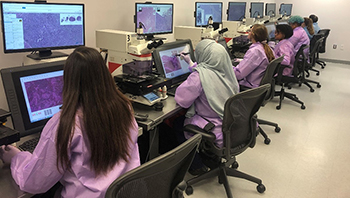 Researchers at the John P. Murtha Cancer Center at WRNMMC study the genetic makeup of cancer cells. As part of the APOLLO research program, the Murtha Cancer Center is undergoing studies related to the genetics found in the tumors of cancer patients. The genetic sequencing of these tumors is leading to new discoveries in the treatment of cancer within active duty service members in the DOD. (Photo courtesy of Walter Reed National Military Medical Center.)
Researchers at the John P. Murtha Cancer Center at WRNMMC study the genetic makeup of cancer cells. As part of the APOLLO research program, the Murtha Cancer Center is undergoing studies related to the genetics found in the tumors of cancer patients. The genetic sequencing of these tumors is leading to new discoveries in the treatment of cancer within active duty service members in the DOD. (Photo courtesy of Walter Reed National Military Medical Center.)
APOLLO studies the genetic components of tumors from cancer patients. According to Shriver, every newly diagnoses cancer patient in on of the Murtha facilities are given the option to join the research program. If a patient opts in, their tumor is run through all available molecular platforms looking at its DNA, RNA, and Protein structure.
According to NCI, the data from the APOLLO program will be “curated and made available publicly through the Genomic Data Commons, Proteomic Data Portal, and Cancer Imaging Archive. Using all of the data available (analytical, invasive, noninvasive, and clinical) will enable researchers to study the relationships among these data, validate results, and develop predictive and prognostic models to improve patient care.”
According to Shriver APOLLO uses precision oncology where researchers look to see if there are any special molecular signatures of an individual’s cancer that be targeted with available drugs. Shriver says that tumors of the same cancer type can have different genetic attributes, which might require different treatments. “We don’t treat every patient with colon cancer the same. You identify any unique aspects of the tumor and say, ‘okay this tumor is special in this way, we identified it through the molecular signature found in the APOLLO program’, and we treat it that way,” said Shriver.
After sequencing the genetic makeup of their tumor, a patient’s blood is then sequenced to find the DNA unique to that person. According to Shriver, many young people with cancer have a genetic germline mutation that could cause cancer. And there are 50 different genes that can lead, in isolation or combined, to an increased risk of cancers.
The APOLLO program also shares any information from their research back with the patient. “We have a very unique, almost unprecedented, genetic return of results program,” Shriver said adding “If we identify that service member X has a germline genetic mutation that could affect them, and their children, for increased cancer risk, we tell the patient that. This is unusual for a research program.”
Shriver says that this information sharing is called translational research. The gap between clinical care and research is translated and provides real benefits to patients and their providers through the genome sequencing of the patient’s blood.
The research from the APOLLO program is already starting to have real benefits to not only the DOD, but the United States population at large. According to Shriver, researchers in the program identified a new genetic signature that can distinguish between patients with lung cancer who will do well with a specific treatment from those who may not do well with said treatment. “If 20% of the population don’t do well for conventional treatment, and by sequencing the genetic of the tumor, we can find those patients and move forward with more unique options,” said Shriver.
The signature is intellectual property, and as such a patent is being filed so that it can be commercialized, and a test can go to the market. Lung cancer patients can take the panel test and providers can predict if they will do well with treatment or should try something else.
While the APOLLO program is beneficial for a more hidden side of the causes of cancer, Shriver still encourages known preventative measure should be taken by all active duty service members. Shriver says that avoiding or quitting use of tobacco and nicotine products are a good common knowledge practice.
According to Director of Gynecologic Oncology at WRNMMC, Air Force Col. (Dr.) Yovanni Casablanca, all service members regardless of gender should get the human papilloma virus, or HPV, vaccine which protects against cervical cancer.
Shriver believes genetic sequencing can be helpful to the DOD’s mission in the future outside of cancer research. According to Shriver, genetic sequencing could be utilized at military intake alongside other medical tests, to determine an individual’s genetic risk to certain cancers. “This wouldn’t be us turning someone away based on their sequencing. Instead we can use this information to help a service member who may be higher risk be aware and take proactive steps to mitigate the potential onset of certain cancers,” said Shriver.
For more information about the Murtha Cancer Center, or the APOLLO program, check their websites.